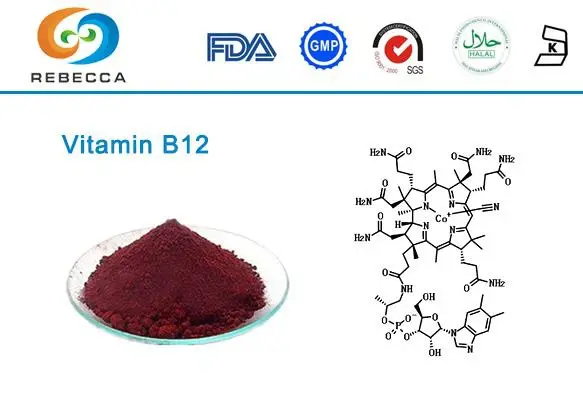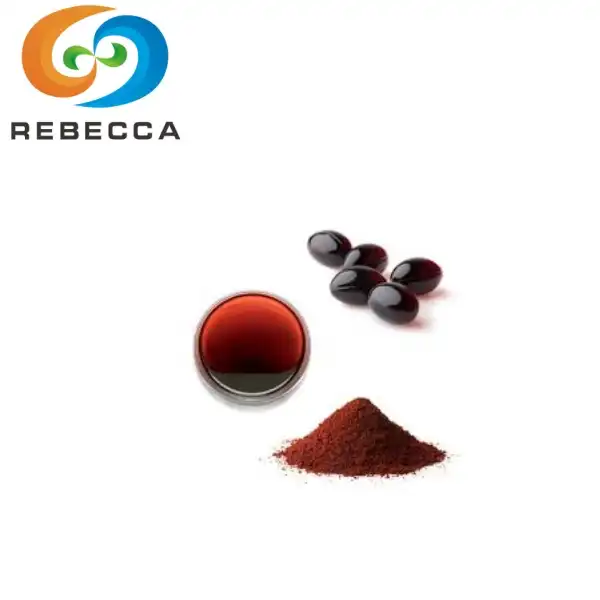Can you take vitamin b12 on an empty stomach?
Vitamin B12 is an essential nutrient that plays a crucial role in various bodily functions, including the formation of red blood cells and proper nervous system function. Many people wonder about the best way to take vitamin b12 cyanocobalamin supplements, particularly whether it's safe and effective to take them on an empty stomach.

Does Taking Vitamin B12 on an Empty Stomach Improve Absorption?
Cyanocobalamin is a water-soluble vitamin, which means it can be absorbed without the presence of food in the stomach. In fact, some research suggests that taking vitamin B12 on an empty stomach may actually improve its absorption. Here's why:
1. Reduced competition: When taken on an empty stomach, vitamin B12 doesn't have to compete with other nutrients for absorption, potentially leading to better uptake by the body.
2. Intrinsic factor availability: The stomach produces a protein called intrinsic factor, which is crucial for B12 absorption. On an empty stomach, there may be more intrinsic factor available to bind with the vitamin.
3. Faster absorption: Without food to slow down the digestive process, vitamin b12 cyanocobalamin may be absorbed more quickly when taken on an empty stomach.
However, it's important to note that individual responses can vary. Some people may find that taking vitamin B12 with food helps reduce any potential stomach discomfort, which brings us to our next point.
Can Vitamin B12 Cause Stomach Discomfort Without Food?
While vitamin B12 is generally well-tolerated, some individuals may experience stomach discomfort when taking it on an empty stomach. This can manifest as:
1. Nausea: Some people report feeling queasy after taking B12 supplements without food.
2. Mild stomach pain: A slight ache or discomfort in the stomach area may occur.
3. Indigestion: Feelings of fullness or discomfort in the upper abdomen can sometimes be experienced.
If you find that taking vitamin B12 on an empty stomach causes discomfort, there are a few strategies you can try:
- Take it with a small snack: A light meal or snack may help alleviate any stomach issues.
- Split the dose: If you're taking a high-dose supplement, consider splitting it into smaller doses throughout the day.
- Try different forms:
Vitamin B12 exists in multiple forms, each with its own unique characteristics, and this diversity can significantly impact how individuals respond to supplementation. Cyanocobalamin and methylcobalamin are two of the most common forms available on the market.

Cyanocobalamin is a synthetic form of vitamin B12. It's widely used in many over - the - counter supplements due to its stability and relatively low cost. When cyanocobalamin is ingested, the body has to convert cyanocobalamin into its active forms, methylcobalamin and adenosylcobalamin. This conversion process occurs mainly in the liver and requires the presence of certain enzymes and co-factors. Some individuals with compromised liver function or genetic mutations that affect these conversion enzymes may not efficiently convert cyanocobalamin into its active forms. As a result, they might experience sub-optimal absorption and utilization of the vitamin, leading to persistent symptoms of deficiency despite regular supplementation.
On the other hand, methylcobalamin is a natural, active form of vitamin B12. It doesn't need to undergo the same conversion process as cyanocobalamin in the body. This can be a significant advantage for those with liver issues or enzyme deficiencies. Methylcobalamin is directly available for the body to use in various metabolic processes, such as DNA synthesis, nerve cell repair, and the formation of myelin, the protective sheath around nerve fibers. Some people report that they tolerate methylcobalamin better, experiencing fewer side effects such as the potential stomach discomfort sometimes associated with cyanocobalamin. Additionally, methylcobalamin may have a more immediate impact on symptoms related to B12 deficiency, such as fatigue and neurological symptoms, due to its ready - to - use nature.
Another form of vitamin B12 is adenosylcobalamin, which is also an active form. It plays a crucial role in the mitochondria of cells, where it's involved in energy production processes. Similar to methylcobalamin, adenosylcobalamin doesn't require conversion in the body. However, it's less commonly found in over - the - counter supplements compared to cyanocobalamin and methylcobalamin.
Remember, it's always best to consult with a healthcare professional before making significant changes to your supplement routine, especially if you're experiencing persistent discomfort.
What Are the Signs of Vitamin B12 Deficiency?
Understanding the signs of vitamin B12 cyanocobalamin deficiency is crucial, as it can help you determine whether you need to adjust your intake or supplementation. Common symptoms of B12 deficiency include:
1. Fatigue and weakness: Low B12 levels can lead to anemia, causing tiredness and lack of energy.
2. Neurological symptoms: Numbness or tingling in the hands and feet, balance problems, and difficulty walking.
3. Cognitive issues: Memory problems, difficulty concentrating, and even depression can be linked to B12 deficiency.
4. Pale or jaundiced skin: A lack of B12 can affect red blood cell production, leading to pale or yellowish skin.
5. Glossitis: Inflammation of the tongue, causing it to become swollen, red, and painful.
6. Shortness of breath and dizziness: These symptoms can occur due to the anemia associated with B12 deficiency.
7. Vision changes: In severe cases, B12 deficiency can lead to vision disturbances.

If you're experiencing any of these symptoms, it's important to consult with a healthcare provider for proper diagnosis and treatment. They may recommend blood tests to check your B12 levels and determine the best course of action.
In conclusion, while taking vitamin B12 on an empty stomach may potentially improve absorption for some individuals, it's essential to listen to your body and adjust your routine accordingly. If you experience discomfort, taking B12 with food or exploring different supplement forms may help. Most importantly, be aware of the signs of B12 deficiency and seek medical advice if you have concerns about your B12 levels.
At Rebecca Bio-Tech, we understand the importance of high-quality vitamin B12 supplements in maintaining optimal health. Our pharmaceutical-grade vitamin B12 powder is designed to meet the needs of various industries, including healthcare products, beverages, and cosmetics. We prioritize reasonable cost control, stable and timely delivery, and controllable product quality to ensure our customers receive the best possible products for their needs.
If you're a purchasing manager, supervisor, or engineer in the pharmaceutical or healthcare industry looking for reliable vitamin B12 supplements, we invite you to explore our offerings. Our team is committed to providing excellent after-sales service and ensuring your satisfaction with our products. To learn more about our vitamin B12 cyanocobalamin or to discuss your specific requirements, please contact us at information@sxrebecca.com. Let us help you meet your vitamin B12 supplementation needs with our high-quality, industry-standard products.
References
1.Rasmussen, H. N., & Schneeman, B. O. (2019). "Nutrient - nutrient interactions: Impact on nutrient bioavailability." Annual Review of Nutrition, 39, 247 - 271.
2. Allen, R. H. (2020). "The role of intrinsic factor in vitamin B12 absorption." Best Practice & Research Clinical Haematology, 33(2), 101157.
3. Carmel, R. (2018). "Pharmacokinetics of vitamin B12." European Journal of Haematology, 101(2), 127 - 134.
4.Bailey, R. L., & Fulgoni, V. L., III. (2019). "Use of dietary supplements is associated with reduced risk of undernutrition and improved nutrient adequacy in the U.S. adult population." Journal of Nutrition, 149(12), 2204 - 2212.
5. Gibson, R. S. (2021). "Principles of nutritional assessment." In Nutritional assessment (3rd ed., pp. 1 - 20). Oxford University Press.








